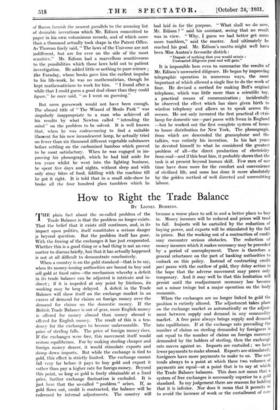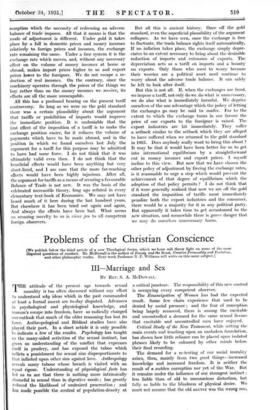How to Right the Trade Balance
BY LIONEL ROBBINS.
THE plain fact about the so-called problem of the Trade Balance is that the problem no longer exists. That the belief that it exists still continues, and, in its impact upon politics, itself constitutes a serious danger is beyond question. But the problem itself has gone. With the freeing of the exchanges it has just evaporated. Whether this is a good thing or a bad thing is not an easy matter to discuss briefly, but that it has actually happened is not at all difficult to demonstrate conclusively.
When a country is on the gold standard—that is to say, when its money-issuing authorities are bound to buy and sell gold at fixed rates—the mechanism whereby a deficit in its trade balance can be adjusted is intricate and in- direct ; if it is impeded at any point by frictions, its working may he long delayed. A deficit in the Trade Balance will show itself on the exchange market in an excess of demand for claims on foreign money over the demand for claims on the domestic money. If the British Trade Balance is out of gear, more English money is offered for money abroad than money abroad is offered for English money. The result of this is a ten- dency for the exchanges to become unfavourable. The price of sterling falls. The price of foreign money rises. If the exchanges were free, this movement itself would restore equilibrium. For by making sterling cheaper and foreign money dearer, it would stimulate exports and damp down imports. But while the exchange is tied to gold, this effect is strictly limited. The exchange cannot fall very far before it pays to buy gold and export it rather than pay a higher rate for foreign money. Beyond this point, so long as gold is freely obtainable at a fixed price, further exchange fluctuation is excluded. It is just here that the so-called " problem " arises. If, as gold flows out, credit is contracted, the balance will be redressed by internal adjustments. The country will become a worse place to sell in and a better place to buy in. Money incomes will be reduced and prices will tend to fall. Imports will be curtailed by the reduction of buying power, and exports will be stimulated by the fall in prices. But the working out of a contraction of credit may encounter serious obstacles. The reduction of money incomes which it makes necessary may be preceded by a period of unemployment. There is therefore a general reluctance on the part of banking authorities to embark on this policy. Instead of contracting credit pari passu with the outflow of gold, they delay action in the hope that the adverse movement may prove only temporary. And it may well be that this hesitation will persist until the readjustment necessary has become not a minor twinge but a major operation on the body economic.
When the exchanges are no longer linked to gold the position is entirely altered. The adjustment takes place on the exchange market as automatically as the adjust- ment between supply and demand in any commodity market. A free price always brings supply and demand into equilibrium. If at the exchange rate prevailing the number of claims on sterling demanded by foreigners is not equal to the number of claims on foreign currency demanded by the holders of sterling, then the exchange rate moves against us. Imports are curtailed ; we have fewer payments to make abroad. Exports are stimulated ; foreigners have more payments to make to us. The rate tends always to a point at which these two volumes of payments are equal—at a point that is to say at which the Trade Balance balances. This does not mean that a system of free exchanges is necessarily superior to a gold standard. In my judgement there are reasons for holding that it is inferior. Nor does it mean that it permits US to avoid the increase of work or the curtailment of con- sumption which the necessity of redressing an adverse balance of trade imposes. All that it means is that the mode of adjustment is different. Under gold it takes place by a fall in domestic prices and money incomes relatively to foreign prices and incomes, the exchange rate remaining the same. Under a free system it is the exchange rate which moves, and, without any necessary effect on the volume of money incomes at home or abroad, makes import prices higher to us and export prices lower to the foreigner. We do not escape a re- duction of real incomes. On the contrary, since the machinery operates through the prices of the things we buy rather than on the money incomes we receive, its effects are all the more unescapable.
All this has a profound bearing on the present tariff controversy. So long -as we were on the gold standard there was a certain plausibility about the argument that tariffs or prohibition of imports would improve the immediate position. It is undeniable that the first effect of the imposition of a tariff is to make the exchange position easier, for it reduces the volume of payments which have to be made abroad, and in the position in which we found ourselves last July the argument for a tariff for this purpose may be admitted to have had some force. I do not think that it was ultimately valid even then. I do not think that the beneficial effects would have been anything but very short-lived, and I am sure that the more far-reaching effects would have been highly injurious. After all, the argument for tariffs as a means of securing a favourable Balance of Trade is not new. It was the basis of the celebrated mercantile theory, long ago refuted in every elementary text-book of Economics. We may not have heard much of it here during the last hundred years. But elsewhere it has been tried out again and again. And always the effects have been bad. What seems an amazing novelty to us is view jeu to all competent foreign observers. But all this is ancient history. Once off the gold standard, even the superficial plausibility of the argument collapses. As we have seen, once the exchange is free to fluctuate, the trade balance rights itself automatically, If no inflation takes place, the exchange simply depre- ciates to an extent necessary to bring about the desirable reduction of imports and extension of exports. The depreciation acts as a tariff on imports and a bounty on exports. Only those who want to worry because their worries are a political asset need continue to worry about the adverse trade balance. It can safely be left to look after itself.
But this is not all. If, when the exchanges are freed, we impose a tariff, not only do we do what is unnecessary, we do also what is immediately harmful. We depriye ourselves of the one advantage which the policy of letting the exchanges go may be said to confer. For to the extent to which the exchange turns in our favour the price of our exports to the foreigner is raised. The export industries are hit inunediately. They suffer a setback similar to the setback which they are alleged to have suffered when we returned to the gold standard in 1925. Does anybody really want to bring this about ? It may be that it would have been better for us to get into international equilibrium by a straightforward cut in money incomes and export prices. I myself incline to this view. But now that we have chosen the other policy of adjustment by freeing the exchange rates, is it reasonable to urge a step which would prevent the achievement of that degree of equilibrium which the adoption of that policy permits ? I do not think that if it were generally realised that now we are off the gold standard the imposition of tariffs must immediately penalize both the export industries and the consumer, there would be a majority for it in any political party. But apparently it takes time to get accustomed to the new situation, and meanwhile there is grave danger that we may do ourselves unnecessary harm.















































 Previous page
Previous page